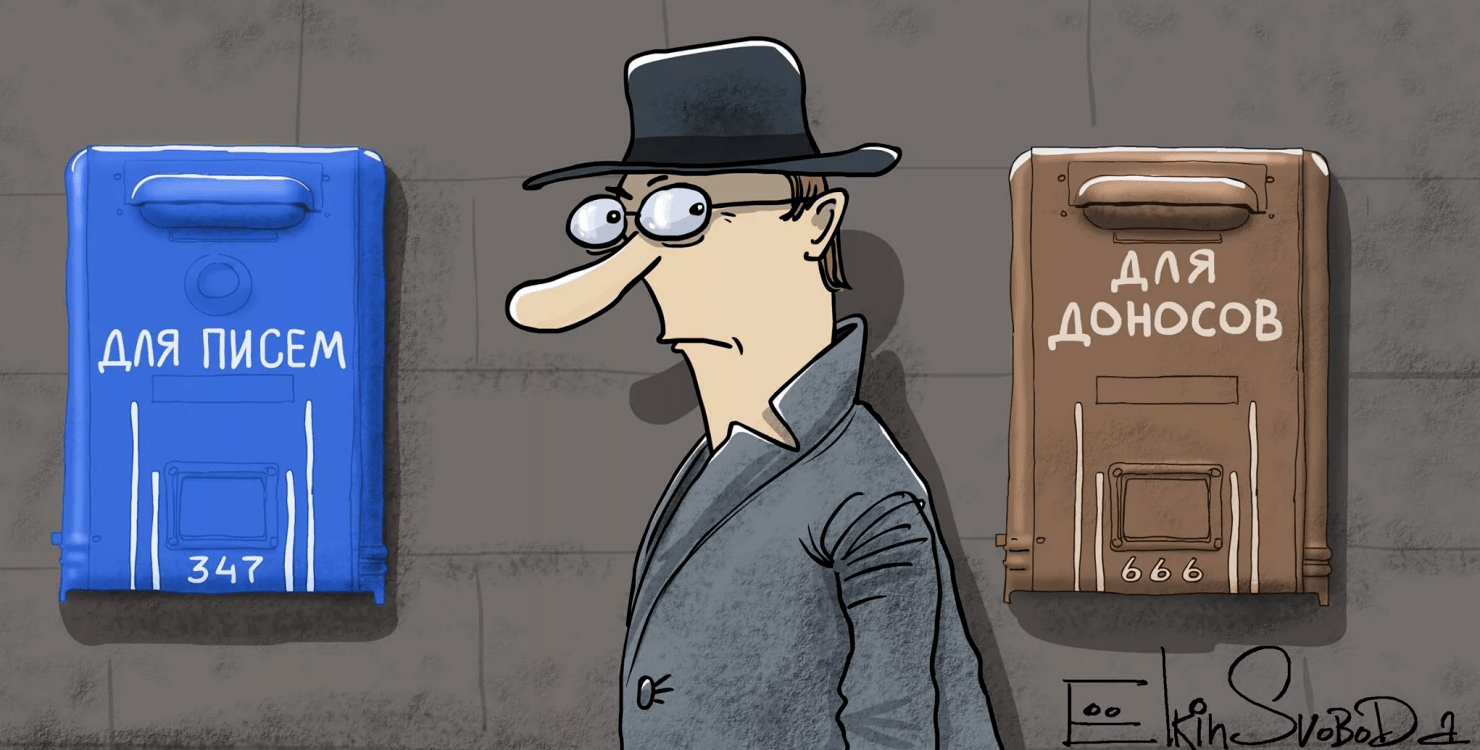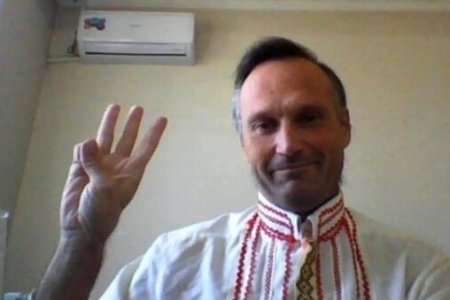
A ‘My Denunciation’ app. available for downloading on Google Play has proven terrifyingly popular, with some of the over five thousand users clearly believing that they are reporting on neighbours or acquaintances for ‘discrediting the armed forces’ or criticizing Russian president Vladimir Putin. The current regime began encouraging Soviet-style denunciations many years ago, and there have been countless occasions over the last 18 months when those expressing criticism of Russia’s full-scale invasion of Ukraine have ended up prosecuted after being reported to the enforcement bodies by students, colleagues, neighbours or even people sitting close by in a restaurant.
The independent publication ‘We Can Explain’ ["Можем объяснить"] reports that the ‘My Denunciation’ app. was created and posted by an IT specialist, referred to as ‘Vladimir’. He left Russia for a country in Europe after Russia’s full-scale invasion and posted the app., seemingly as a parody, in January 2023. This was his second attempt, with the first app, back in 2018, attracting very little interest.

Although the logo is reminiscent of the Russian ‘State services’ site, the description of the app does state that the app “is not linked with state institutions”. It was clearly understood as a joke (or as hearkening back to Stalin’s Terror) by some of the users. Underneath the app, for example, ‘STAR BOMB Shcherban thanks the creators of the app “for the salvation of our Great nation from all fascists and enemies of the people!!!” I lodged a complaint against my 98-year-old grandfather, a War veteran, and he was executed within 20 minutes!!! I now own all his property!!! Unbelievably pleasant memories of 1937. Definitely 5 stars.” Another praises the app, saying that “they came for my neighbour in half an hour”, and next in line are another neighbour, his wife and their dog!
Those who write denunciations almost always hide behind more euphemistic terms, and the very title “My denunciation’ should have made it clear that this was not a genuine platform for denouncing colleagues or neighbours. So should other parts of the description, including the promise that “administrators may examine the denunciations and take relevant measures”.
Some of the users have, nonetheless, seen it as an opportunity to write real denunciations. The publication had asked Vladimir back in January 2023 what he would do if the denunciations proved to be real. He clearly thought it a good thing that they would write to the app as their attempted denunciations would thus have no effect, and not get the intended target into the trouble they might otherwise have faced. He added then that he was pleased when he read either negative opinions of the app itself, or criticism of the authorities..
The number of ‘real’ denunciations invariably rises in response to reports in the media, about drone attacks, attacks, etc. People look on Google, he assumes, and download his app without particularly scrutinizing it.
By May 2023 over 10 thousand people had downloaded the app, with over 5 thousand ‘denunciations’. While most are jokes, or directly criticize the app’s creators or the whole institution of denunciations, around 20% are for real. These are individuals who write detailed accounts of supposed ‘infringements’ and provide personal data. Of these intended denunciations, most could prompt the enforcement bodies to initiate criminal or administrative proceedings over supposed ‘fakes’ or ‘"discrediting the army’.
‘We Can Explain’ has examined some of the real denunciations and also contacted the intended targets. One person was ‘reported’ for expressing criticism of Russia’s full-scale invasion of Ukraine (referred to by the denouncer as ‘the special military operation’). There are also denunciations for criticizing Putin, with one of these being against a supporter of Russia’s aggression who strongly criticizes the regime for being “too soft”. One horrendous denunciation asks for an acquaintance who has ignored two call-up notices to be sent to the front. Many others also provide information on those who are trying to hide out in order to not face mobilization.
The publication spoke with a 36-year-old (‘Mikhail’) who had been the target of six denunciations, asking for “measures” to be taken against him for supposedly ‘discrediting the Russian army’ and criticizing Putin. . Mikhail told the journalists that he was not surprised, and said he assumed that a denunciation was written by his former partner. They had separated, with a main reason being their diametrically opposed views, clearly about the war and about Putin. Mikhail says that he “tried to give her sources (of information); data; any information. But she didn’t want to change the life she’s accustomed to.”
He expected this, he notes, and says that anyone fighting for freedom should be ready for such denunciations, which are “attempts to anonymously shoot from a slingshot at your neighbour’s window. All of this just as it was in the USSR.”
The most common prompts for denunciations in the app, as well as according to the publication’s own data, are over posts in social media or conversations overheard. Around 60% of the ‘real’ denunciations could lead to prosecution under the draconian silencing laws (about ‘fakes’ and ‘discrediting’ the army) rushed into legislation within 10 days of Russia’s full-scale invasion of Ukraine.
The publication has estimated that half of the real denunciations were against neighbours or people they knew. Like in Soviet times, the motives may be genuine ‘outrage’ , personal animosity or some kind of material benefit.
Perhaps the authors are right to find “hope” in the fact that most of those responding on the app want peace and criticize denunciations. On the other hand, there are many more direct ways of denouncing those criticizing Russian aggression, the Kremlin, etc. and these have certainly contributed to the huge number of prosecutions in Russia and occupied Crimea. In the latter, at least two teachers have been reported to the authorities, lost their jobs and even faced criminal prosecution after initially being reported by students or their parents. Others have been jailed and/or fined for playing or singing Ukrainian patriotic songs. While there are a few especially notorious denouncers, like Aleksandr Talipov, Russia’s methods of terror and of indoctrination have led to a situation where people really are afraid of being ‘denounced’.



